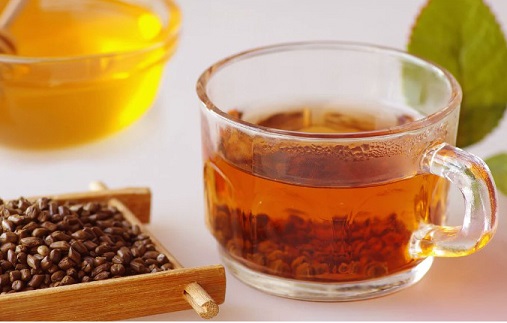Taiwanese Study Uncovers the Benefits of Cassiae Tea for Eye Health in the Elderly and Smartphone Users
Nikhil Prasad Fact checked by:Thailand Medical News Team Dec 30, 2024 3 months, 2 weeks, 1 hour, 49 minutes ago
Medical News: Presbyopia, a natural part of aging, is a common issue affecting millions worldwide. It hampers near vision and is often accompanied by other eye conditions like dry eye syndrome and elevated intraocular pressure (IOP). While glasses, contact lenses, and surgical interventions remain the standard treatments, researchers from Taiwan have explored an alternative approach - Cassiae tea. This
Medical News report delves into their comprehensive study, which highlights how this traditional herbal remedy could offer relief for presbyopia and related ocular conditions.
 Taiwanese Study Uncovers the Benefits of Cassiae Tea for Eye Health in the Elderly and
Taiwanese Study Uncovers the Benefits of Cassiae Tea for Eye Health in the Elderly and
Smartphone Users
The study, conducted by researchers from Kaohsiung Armed Forces General Hospital, Meiho University, and Tajen University, aimed to determine the impact of Cassiae tea on presbyopia, dry eyes, IOP, and pupil size.
Understanding the Study
The researchers conducted a six-month clinical trial involving 425 participants aged around 52.5 years. Each participant consumed Cassiae tea brewed from 10 grams of Cassiae seeds in 500 ml of water daily. A control group consumed water with vitamin C for comparison. The effects of Cassiae tea were evaluated across several dimensions, including near vision, tear production, IOP, and antioxidant properties.
Key Findings
-Improved Tear Production and Relief from Dry Eyes
Dry eye syndrome, often linked to presbyopia and excessive screen use, can significantly reduce quality of life. Schirmer’s test, a method to measure tear production, showed marked improvement among participants drinking Cassiae tea. By the fourth month, tear production increased significantly, providing relief from dry eye symptoms.
-Lowering Intraocular Pressure
Elevated IOP is a major risk factor for glaucoma, a condition that can lead to vision loss. The study revealed that Cassiae tea significantly reduced IOP levels, with effects comparable to those of Alphagan-P®, a commonly prescribed glaucoma medication. Importantly, Cassiae tea achieved this without the side effects often associated with conventional treatments.
-Enhanced Near Vision
One of the most notable findings was the improvement in near vision. Participants experienced a significant reduction in presbyopia symptoms, with improvements evident as early as the fourth month. This effect was particularly pronounced among those consuming higher doses of the tea.
-Pupil Constriction and Better Visual Sharpness
Smaller pupils improve depth of field and reduce visual distortions. The study observed that Cassiae tea consumption led to a reduction in pupil size, enhancing visual clarity and reducing aberrations.
-Boosted Antioxidant Activity
Cassiae tea demonstrated exceptional antioxida
nt properties, surpassing other natural compounds like anthocyanins and vitamin C. This antioxidant capacity is attributed to the tea's rich content of bioactive compounds, which combat oxidative stress - a key factor in age-related eye conditions.
Mechanisms Behind the Benefits
The benefits of Cassiae tea are believed to stem from its rich composition of antioxidants and bioactive compounds. These compounds enhance tear production, reduce oxidative stress, and improve ocular blood flow. Additionally, the tea's components help relax the ciliary muscles, aiding accommodation and reducing presbyopia symptoms.
Implications for Smartphone Users
The rise of "smartphone presbyopia," caused by prolonged close-up screen use, highlights the relevance of this study. Cassiae tea offers a natural way to counteract the visual strain and accommodative issues associated with excessive digital device usage.
Conclusions
Cassiae tea emerges as a promising natural remedy for managing presbyopia and associated conditions like dry eyes and elevated IOP. Its ability to enhance near vision, improve tear production, and reduce oxidative stress makes it a valuable addition to daily routines, especially for those engaged in near-distance activities such as smartphone use.
While further research is needed to refine dosage recommendations and understand long-term effects, the findings suggest that incorporating Cassiae tea into one’s diet could offer a safe, non-invasive, and cost-effective solution for maintaining ocular health.
The study findings were published in the peer-reviewed journal: Medicina.
https://www.mdpi.com/1648-9144/61/1/35
For the latest on Eye Health, keep on logging to Thailand
Medical News.
Read Also:
https://www.thailandmedical.news/news/new-study:-daily-blue-light-exposure-from-computers-and-smartphones-accelerates-brain-damage-and-aging
https://www.thailandmedical.news/news/protecting-eyes-from-blue-light-with-iik7-treatment
https://www.thailandmedical.news/articles/ophthalmology-(eye-diseases)
https://www.thailandmedical.news/articles/herbs-and-phytochemicals
https://www.thailandmedical.news/articles/anti-aging
